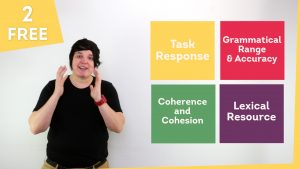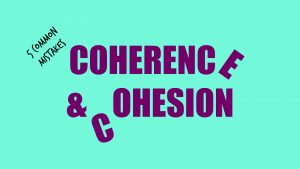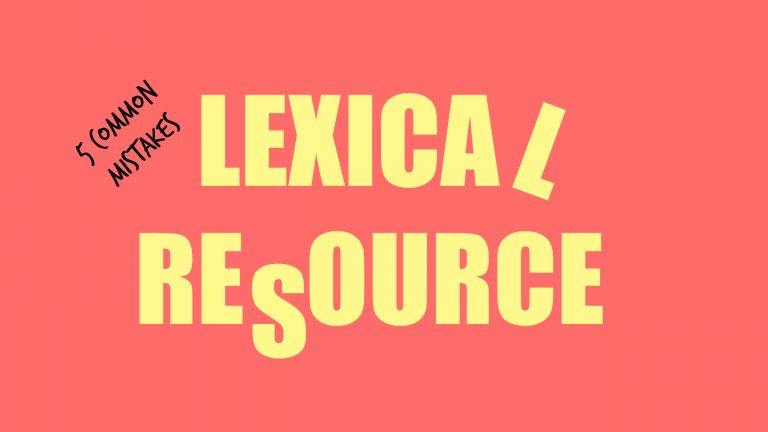
5 Common IELTS Lexical Resource Mistakes
Hey! Today I want to complete my series of “common IELTS mistakes” by looking at IELTS Lexical Resource. If you haven’t already read my previous posts on Task Response, Coherence and Cohesion, or Grammar, I recommend that you have a look at those lessons too. You will find that the four blog posts together, offer you a powerful insight into the main problem areas that most examiners see as they mark.
However, there is a reason why I have left IELTS Lexical Resource until the end – for me, it is the hardest part of the IELTS test to teach. So, before we move on to the common errors, let’s spend a couple of moments looking at what you need to score a 7.0 or more for Lexical Resource.
An Introduction to IELTS Lexical Resource
I get more questions about Lexical Resource than any other part of the IELTS Band Descriptors (click to watch my free video lesson).
The problem is that for many students, the band descriptors for LR look very “vague”. For example, look at the two dscriptors for a Band 6.0 and a Band 7.0:
- For a 6.0 you need “enough lexis to be able to discuss topics at length”.
- For a 7.0 you need to use “some less common and idiomatic vocabulary and show awareness of style and collocation”.
Less common words
But what does “less common” mean? If you are a language teacher, I can tell you that it is C1 level lexis – the type that is taught in any good Advanced text book (such as English File or Speak Out). But, if you are a student, it is very hard for me to summarise what is considered “less common”, as you don’t know the lexis that we teach to students at different levels (i.e. Beginner, Intermediate, Upper Intermediate, etc).
What I can tell you is that it does not mean that these words are less common for native speakers.
This is a common misconception and why many students think that it is a good idea to use a thesaurus to find the most difficult version of a word that they can (as I explain later, this is never a good idea). No, it means that they are less common words for second-language speakers to produce. For example, if you are discussing the environment, you would expect most good speakers to produce words like “climate change” or “fossil fuels” but not so many to be able to produce words like “contaminated” or “sustainable development”.
The Importance of collocation in IELTS
However, as you will find out in a moment, high-level lexis is rarely about knowing one word, but being able to produce phrases that show a knowledge of collocation. What is collocation? It is knowing that certain words are used naturally together. Simple examples of this are the many verbs in English that collocate with either “make” or “do”. For example, we “do our homework” but we “make dinner“. There is no reason why these words collocate together – you just have to learn them.
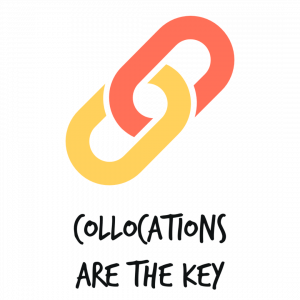
A more advanced collocation would be knowing that we say “a wide gap” but “high cost” and “vast improvement” – in each of these phrases the adjective means “big”, but they collocate with different nouns. You cannot say “high gap” or “wide improvement” (but you can say “vast cost” and “vast gap”!!!!!).
Obviously, it is impossible for me to teach you every good collocation – my advice would be to find a good IELTS vocabulary book that is divided into topics, or study a CAE or CPE course. However, what I want to impress on you most is this:
Never use a word unless you are 100% sure what it means (and how it is used in context).
The best word for your sentence is always the one that puts your idea across most clearly.
Almost all of the students who come to me for help actually have a good enough lexis to score a 7.0 and if they followed these simple rules, they would save themselves a lot of time and money on failed tests. So, now that we have covered the basics, let’s look at the 5 most common errors with lexical resource that I see when I correct essays.
Want to know how the examiner will apply the band descriptors when marking your IELTS essay?
Then download a copy of our FREE e-book, which explains how each of the four marking criteria is applied and includes the most common errors made by test-takers. Just click here for your copy.
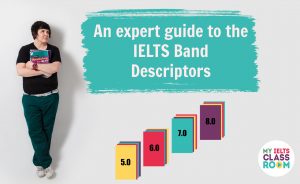
1. Poor paraphrasing / Over-paraphrasing
This is by far the most common problem I see and the one that has the most damaging effect on a student’s score. I think that most of the time poor paraphrasing is born from one simple misconception: You can never repeat words in IELTS.
THIS IS NOT TRUE
If any teacher tells you that it is “wrong” to repeat words in an essay, then please tell them “Thank you for your help, but please give me a refund as I’m leaving this school”. Yes, there are times when paraphrasing is great and will definitely boost your Lexical Resource score, but (and it’s a big but!), not every word in English has a good synonym (what is the synonym for “music”?), and there are very few words that have three or four.
More often than not, it is much better to use a mix of referencing and one or two nouns than to keep coming up with increasingly long “paraphrases” that just confuse the reader!
 This week, one of my new students tried to use “grouped affair” as a replacement for “group activities” – this makes no sense at all. If you went up to a native speaker and asked them “Do your children take part in grouped affairs?” they would stare at you with a blank face and slowly walk backwards away from you. In the same way “kith and kin” are not “family”, “investing” is not the same as “purchasing” and “shopaholics” are not “shoppers” (and they are definitely not “clients who approach directly to physical stores“!!!!)
This week, one of my new students tried to use “grouped affair” as a replacement for “group activities” – this makes no sense at all. If you went up to a native speaker and asked them “Do your children take part in grouped affairs?” they would stare at you with a blank face and slowly walk backwards away from you. In the same way “kith and kin” are not “family”, “investing” is not the same as “purchasing” and “shopaholics” are not “shoppers” (and they are definitely not “clients who approach directly to physical stores“!!!!)
In the same way, you have to make sure that your paraphrase is correct in CONTEXT. Just because words have the same meaning, it doesn’t mean that they can be used in every situation. Yes, we have single–sex schools, but there are no one–sex schools. Yes, you can meet something in “real life“, but you cannot meet them in “actual life” (these are real examples from essays I was sent this week!). So, let me make this clear:
- If you find yourself struggling to think of a synonym or, if you have already used one or two, JUST REPEAT THE WORD FROM THE TASK or use REFERENCING.
- If your “paraphrase” is six or seven words long, JUST REPEAT THE WORD FROM THE TASK or use REFERENCING .
- If you don’t know if your synonym can be used in this context, JUST REPEAT THE WORD FROM THE TASKor use REFERENCING.
When you paraphrase poorly, at best you are harming your LR score, at worst you are damaging your LR and C+C scores (as a lot of poor paraphrases have no meaning and therefore affect the coherence of your essay). I have written about this in much more detail in another blog post, so if you still have questions, maybe go and have a read there.
2. Focusing on one word instead of collocations
This second problem is connected to the first. Many students look for one “glory” word that they can add to a sentence to boost their LR score. Unfortunately, many have no idea what that word really means (they just used a thesaurus to find it) and so they have no idea of the right CONTEXT or COLLOCATION for the word (which leads to the problems I have just described above).
The key to avoiding this error is to stop focusing on learning SINGLE words, but instead learning GROUPS of words (or as we say in English language classrooms “chunks”). In the introduction, I explained that the words “contaminated” and “sustainable development” score more highly than “climate change” or “fossil fuels” as they are “less common”. However, no single word will ever score as highly as a phrase like “on the brink of extinction” or “a concerted effort is needed”. Phrases show an awareness of collocation much more than a single word like “deforestation” (which most of my students seem to think will automatically get them a 7.0!).
Therefore, I strongly recommend that you stop seeing lexis as “words” and start seeing it as “phrases” or “chunks” of language (which are, again, what we teach in Advanced books).
3. Changing transition signals / opinion language
In a way, this is my “favourite” problem. Lots of students take IELTS each year before they are ready to sit the exam. They have an Intermediate level of English (so not enough to get a 7.0 for LR) but they think that they can “trick” the examiners by learning some “high-level lexis that can be used in any essay” (I am putting this in speech marks, but it is not “high-level lexis” and it does not “trick examiners”).
The words they generally target for this are transition signals (the words we use to show the relationship between sentences) and the phrases that we use to give opinions. For example, rather than saying “Firstly“, the student says “To embark upon” (which has no meaning at all), or rather than saying “In conclusion“, they say “To recapitulate” (again, this has no meaning), and rather than say “I believe” they say “I opine“.
If this is you, please stop. These words are FUNCTIONAL and cannot be changed or replaced. You can read more in my blog post Coherence and Cohesion why this is a bad idea.
I know that this is not what you want to hear, but there is no short cut for learning lexis. It is a long, time-consuming process. If if you want a high score, you will have to take the time to learn a wide-rage of topic-specific lexis (sorry!).
4. Dependent prepositions
I always knew that dependent prepositions were tricky, but it is only when you sit down to mark eight essays and every one of them contains three or four errors, that you realise how tricky they are!
What are dependent prepositions? Well certain verbs, nouns and adjectives are always followed by a particular preposition. There is no logic to which preposition – you just have to learn them. Some are easy, for example, what preposition always follows the verb “depend”?
Hopefully you are shouting “on”. What preposition always follows the adjective “interested”? That’s right, “in”. However, there are many dependent prepositions that students get wrong over and over again. For example, what follows the verb “dispose” or the noun “impact”?
I have a whole lesson on dependent prepositions that you can link to here.
It contains a FREE worksheet that tests your knowledge of 30+ common dependent preposition collocations. Even if you are a high-level student, I recommend that you have a look, as these mistakes can stop you having “error-free sentences” which will also have an impact on your GRA score.
5. Spelling Errors
This one is rather obvious, but I had to include it, as this is the problem that affects higher-level students the most. I have been thinking about sitting the exam for a long time now (just to see what the experience is like from a student’s perspective) but what stops me is my spelling. I have a very wide vocabulary, but having spent 20 years typing on a computer with spell-check, I am sure that many of the words that I would like to use in an essay would be hard for me to spell.
Recently, it took me about 2 minutes to work out how to spell “succumb” in a message to a friend and, even though I know how to spell it now, I still stumble when I have to spell “unnecessary” (is it two n’s or two c’s..???). Yes, we want to include high-level lexis, but you have to be sure that you are able to spell every word you use in essays. My motto has always been:
If you don’t know how to spell a word, you don’t really “know” the word.
There are no “fixed rules” as to how many spelling errors you can make in your essay / letter / report. If you look at the band descriptors you can see that:
- 8.0 – errors are rare
- 7.0 – errors are occasional (that’s not an easy word to spell!)
- 6.0 – there are “some errors”
What is the difference between “occasional” and “rare”? Well, that will be up to your examiner, but I would say that we want to keep spelling errors below 5 in an essay, 2 or 3 would be better, but none is ideal. Obviously, the examiner will also take into account the complexity of the word you are spelling too (spelling “which” as “wich” is a much bigger word error than confusing an “a” for an “i” in “illegibility”). My advice?
- Keep a spelling book. Write down every word you find difficult to spell and test yourself daily.
- Turn off your spell check when you write your essays and then turn it back on to count your errors!
The 5 most common IELTS Lexical Resource mistakes: Summary
- Poor paraphrasing (i.e. using too many words to paraphrase or using a poor synonym)
- Focusing on one word instead of chunks (i.e. using words with no consideration of context or collocation)
- Trying to gain points for lexis by changing transition signals or opinion language (i.e. changing words that cannot be changed)
- Poor use of dependent prepositions (i.e. not knowing which prepositions follow certain words)
- Incorrect spelling
I hope that you found this blog post useful. My main advice would be to “keep it simple”. You really only need 4 or 5 less common lexical items to get a 7.0. It is not that students lack the vocabulary to get this score, it is that they “try too hard” and end up destroying their essays with ridiculous paraphrases.
If you are looking to work with an IELTS teacher who cares about your progress and works closely with you to achieve your desired results, then why not come and join me at My IELTS Classroom? I really hope to see you there soon.
